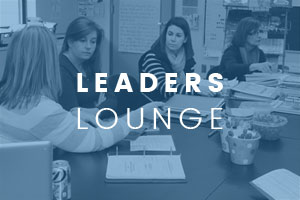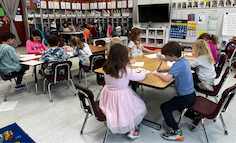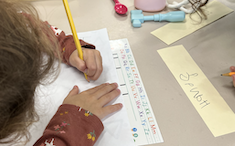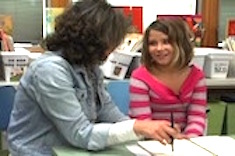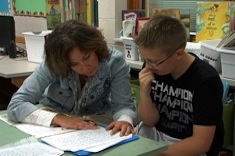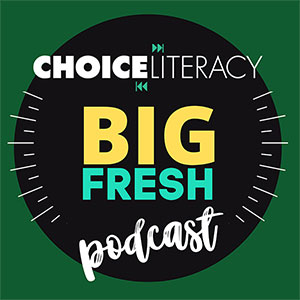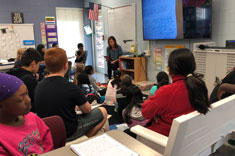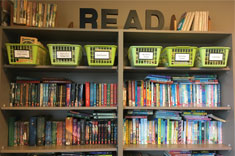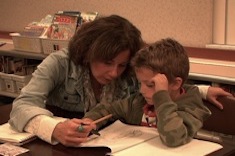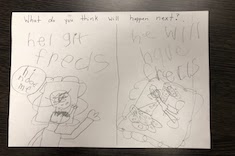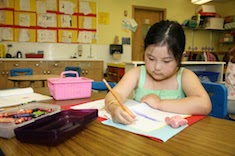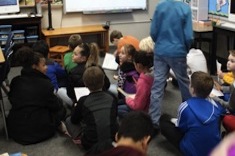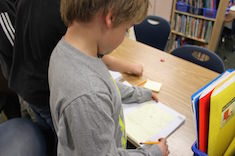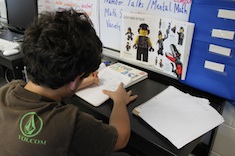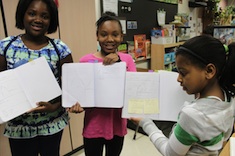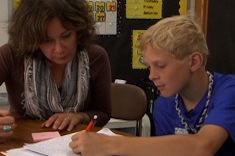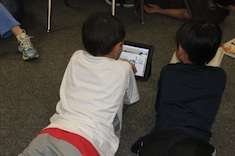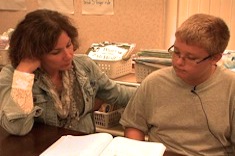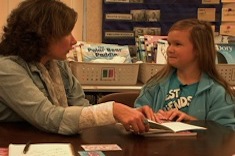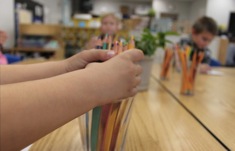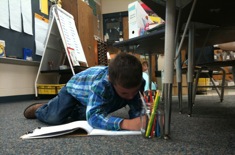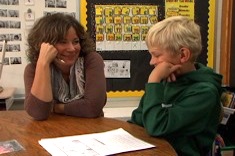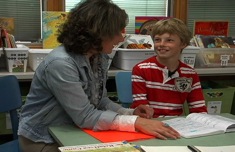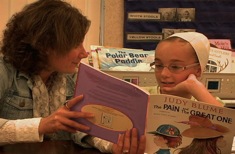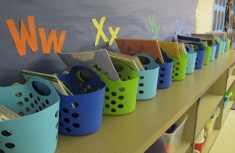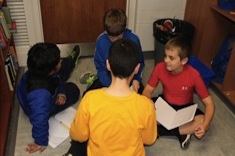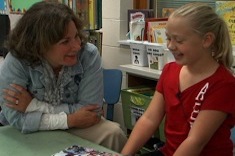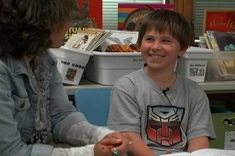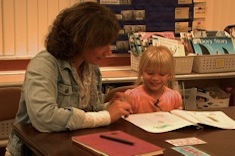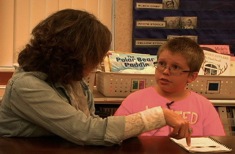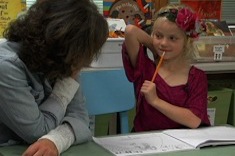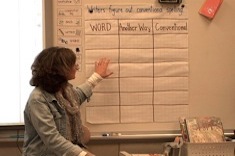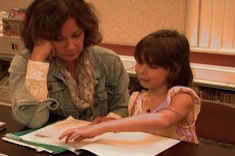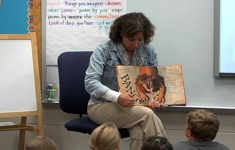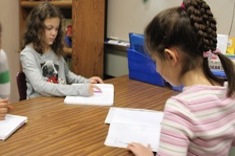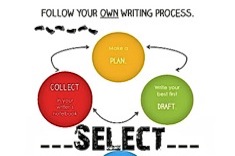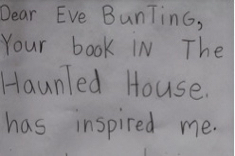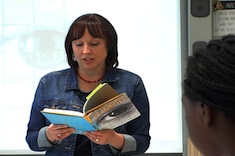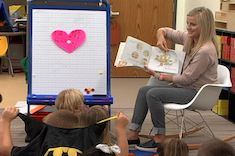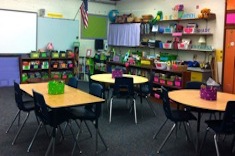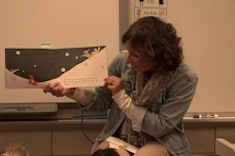Ruth Ayres
Ruth Ayres is the editor in chief of the Choice Literacy site and director of The Lead Learners in northern Indiana. She spends her days helping school leaders build skills and confidence as change agents, and encouraging instructional influencers to reflect and refine the art of coaching. Ruth’s background includes work as a middle and high school language arts and science teacher and as a K-12 instructional coach, and writing books, articles, and lots of blog posts. She has written Enticing Hard-to-Reach Writers (Stenhouse, 2017) and many other books. Ruth and her husband, Andy, have four children. When not writing professionally, Ruth collects stories of adoption, faith, and whimsy. You can follow her at Ruth Ayres Writes or on LinkedIn.
All Content
February 13, 2026: Special Edition: Straight from the Heart
This week’s newsletter is a special edition curated with articles straight from the hearts of our contributors.
January 23, 2026: Let’s Talk about Books!
This week’s newsletter highlights the Book Guides.
January 16, 2026: The Humanity of Teaching
This week’s newsletter is a reminder abut the heart of teaching..
December 12, 2025: Let Choice Shine
This week’s newsletter is about practical ways to offer students choice.
December 5, 2025: Be Yourself (It’s Enough)
This week’s newsletter is about the importance of showing up fully as yourself and finding joy in uplifting readers and writers.
November 28, 2025: Hunt for the Celebration
This week’s newsletter is a note from Ruth.
November 21, 2025: Food and Community
This week’s newsletter is about food and community.
November 14, 2025: Protecting Inquiry
This week’s newsletter is about protecting inquiry.
November 7, 2025: Tools to Foster Independence
This week’s newsletter is about fostering independence with tools.
October 31, 2025: Moments to Cherish
This week’s newsletter is about noticing and cherishing special moments in classrooms.
October 24, 2025: Adjusting to Change
This week’s newsletter is about adjusting to changes.
September 26, 2025: Relevant and Reliable Texts
This week’s newsletter is about reliable and relevant texts.
September 12, 2025: A Love of Reading
This week’s newsletter is about developing a love for reading.
September 5, 2025: Being Active as a Reader and Writer
This week’s newsletter is about being active as a reader and writer.
August 29, 2025: Authentic Writing Experiences
This week’s newsletter is about being authentic when teaching writers.
August 8, 2025: Anchor Charts
This week’s newsletter is about anchor charts.
August 1, 2025: Simple Joys
This week’s newsletter is about simplifying the start of the school year.
July 25, 2025: Let’s Get Started
This week’s newsletter is about getting started with the new school year.
June 27, 2025: Restore, Refresh, Rejuvenate
This week’s newsletter is about inspiring renewal.
June 20, 2025: Choice Numeracy
This week’s newsletter highlights Choice Numeracy.
June 13, 2025: Generative AI (Part II)
This week’s newsletter is about generative AI.
June 6, 2025: Generative AI (Part I)
This week’s newsletter is about generative AI.
May 30, 2025: Nourish Independence
This week’s newsletter is about nourishing independence.
May 23, 2025: Have More Fun
This week’s newsletter is about having fun with teaching and learning.
May 9, 2025: Brain-Based Learning
This week’s newsletter is about connecting with students so they can be positioned to learn.
May 2, 2025: Keeping Steady (Part 2)
This week’s newsletter is the second installment about keeping steady with wise instructional practices.
April 25, 2025: Keeping Steady (Part 1)
This week’s newsletter is about keeping steady with wise instructional practices.
April 18, 2025: Differentiation
This week’s newsletter is about differentiating with precision.
Pay Attention to What You Pay Attention To: Leveraging the Power of a Door
Ruth Ayres invites us use our doors as an opportunity to share core values and inspire others. As leaders, we are change makers. We can leverage attentional bias to help make change positive and joyful in our schools.
April 11, 2025: Conversation in Small Groups
This week’s newsletter is about lifting the level of small group conversations.
April 4, 2025: Helping Students Take Charge of Their Learning
This week’s newsletter is about helping students take charge of their own learning.
March 21, 2025: Give Space and Time for Learning
This week’s newsletter is about giving space and time for learning.
March 14, 2025: Let’s Learn!
This week’s newsletter is about literacy in all subjects.
March 6, 2025: Writing Process Tips
This week’s newsletter is about the writing process.
The Tension of Perfect Conventions
Everyone knows that writing is a superb strategy to help students learn new information. However, what happens when the conventions are less than stellar in student writing? Ruth Ayres offers advice for how coaches and literacy leaders can navigate the tension of conventions with teachers.
February 28, 2025: Finding Possibilities with Mentors
This week’s newsletter is about mentor texts.
February 21, 2025: Let Hope Stick
This week’s newsletter is about letting hope stick.
February 14, 2025: Spark Reading Response
This week’s newsletter is about sparking reading response.
February 7, 2025: Boost Talk = Boost Learning
This week’s newsletter is about boosting talk in your classroom.
January 31, 2025: Meaning Matters
This week’s newsletter is about making meaning with our learning.
January 24, 2025: Ways to Show Learning
This week’s newsletter is about assessing student learning.
December 20, 2024: Graphic Novels and Novels in Verse
This week’s newsletter is about graphic novels and novels in verse.
December 13, 2024: Literacy in All Subjects
This week’s newsletter is about literacy in all subjects..
December 6, 2024: Gratitude
This week’s newsletter is about the importance of gratitude.
November 22, 2024: Vulnerability
This week’s newsletter is about fostering strong connections.
November 8, 2024: Growing Writers
This week’s newsletter is about growing writers.
November 1, 2024: A Community of Secondary Readers
This week’s newsletter is about nourishing a community of secondary readers.
October 25, 2024: Talking Politics?
This week’s newsletter is about talking politics with students.
Overcoming the Blame Game
Ruth Ayres and Becca Burk consider the nuances of the aftermath when dysregulation happens and how members of a school community can avoid blaming one another for the situation and instead work together.
October 18, 2024: Learning to Collaborate
This week’s newsletter is about helping students learn to share ideas.
Ways to Support Colleagues Part 2
Ruth Ayres and Becca Burk share ways to strengthen our teamwork and help lower the stress levels of adults in the school when students exhibit dysregulated behaviors. This is the second installment of a two-part series.
October 11, 2024: A Community of Readers
This week’s newsletter is about building a reading community.
Ways to Support Colleagues, Part 1
Ruth Ayres and Becca Burk share ways to strengthen our teamwork and help lower the stress levels of adults in the school when students exhibit dysregulated behaviors. This is the first installment of a two-part series.
October 4, 2024: A Love of Books
This week’s newsletter is about the power of learning to love books.
September 27, 2024: No Struggle, No Story
This week’s newsletter is about planning narratives.
September 20, 2024: Tough Ones
This week’s newsletter is about small connections that make a big difference.
Reshaping Data Stories
Ruth Ayres encourages us to take a second look at the data stories we are telling about students. She shares four areas to help us see a more complete picture of a student.
Re-energizing Norms with Mantras (Part 3)
Ruth Ayres takes a creative approach to making sure our norms are serving the team rather than our teams disengaging from the norms. This is the last of three installments in a series about norms.
September 13, 2024: Create Space
This week’s newsletter is about protecting time and space for learning.
Nuances of Norms (Part 2)
Ruth Ayres tackles the common resistance to norms. When norms seem to suck the energy out of the room, don’t make the mistake of thinking you need a new list of norms. Try one of these ideas to use norms to energize your team.
September 6, 2024: Beginning a New School Year
This week’s newsletter is about beginning a new school year.
August 30, 2024: Belonging
This week’s newsletter is about belonging.
Are Norms the Problem? Part 1
Ruth Ayres shares the details of developing and using norms in intentional and meaningful ways. This is the first of three installments in a series about norms.
August 9, 2024: Good Vibes to Start the School Year
This week’s newsletter is full of good vibes to start the school year.
A Necessary Survey for Your School Community
Ruth Ayres and Becca Burk share a necessary survey for your school community to begin engaging in conversations about managing emotional dysregulation in students. Drawing on their extensive experiences with managing emotional dysregulation as foster parents and educators, they make a case for beginning conversations among your faculty with this simple survey.
August 2, 2024: School and Classroom Libraries
This week’s newsletter is about school and classroom libraries.
July 26, 2024: Spinning Ideas for the New School Year
This week’s newsletter is full of inspiring ideas for the new school year.
June 28, 2024: Summer Reading
This week’s newsletter is full of booklists to help with your summer reading.
June 21, 2024: Fluency
This week’s newsletter is about building fluency.
June 14, 2024: Thinking More Deeply About Characters
This week’s newsletter is about thinking more deeply about characters.
June 7, 2024: Nurture Independence
This week’s newsletter is about nurturing independence.
May 31, 2024: Don’t Miss the Joy
This week’s newsletter is about finding joy in our work.
May 24, 2024: Holiday Reading
This week’s newsletter is about the unexpected learning that happens over time.
May 17, 2024: What Surprises You?
This week’s newsletter is about the unexpected learning that happens over time.
May 10, 2024: Elevate Readers’ Thinking
This week’s newsletter is about elevating readers’ thinking.
May 3, 2024: Invaluable Teaching Tools
This week’s newsletter is about invaluable teaching tools.
April 26, 2024: Vocabulary
This week’s newsletter is about building vocabulary.
April 19, 2024: Informational Writing
This week’s newsletter is about informational writing.
March 22, 2024: Content Literacy
This week’s newsletter is about content literacy.
March 15, 2024: Differentiation
This week’s newsletter is about differentiation.
March 8, 2024: Word Study
This week’s newsletter is about word study.
March 1, 2024: Thinking Ahead to National Poetry Month
This week’s newsletter is about thinking ahead to National Poetry Month.
February 24, 2024: Firming Up Routines
This week’s newsletter is about firming up routines.
February 16, 2024: The Tough Ones
This week’s newsletter is about the tough ones
February 9, 2024: Speaking and Listening
This week’s newsletter is about the importance of listening.
February 2, 2024: Nourishing Growth
This week’s newsletter is about nourishing growth in students and educators.
January 26, 2024: Finding Joy in Learning
This week’s newsletter is about prioritizing joy in school.
January 19, 2024: Research Notes
This week’s newsletter is about students collecting research notes.
January 12, 2024: Poetry
This week’s newsletter is about poetry.
December 22, 2023: 10 Articles from 2023
This week’s newsletter is a roundup of 10 articles from 2023.
December 15, 2023: Top Issues from 2023
This week’s newsletter is a roundup of issues from 2023.
December 8, 2023: Curiosity
This week’s newsletter is about curiosity.
December 1, 2023: Care and Compassion
This week’s newsletter is about care and compassion.
November 17, 2023: Supporting Writers
This week’s newsletter is about supporting writers.
November 10, 2023: Beat Overwhelm!
This week’s newsletter is about beating overwhelm!
November 3, 2023: Reading Instruction
This week’s newsletter is about reading instruction.
October 20, 2023: Tools to Empower Engagement
This week’s newsletter is about tools that empower engagement.
October 13, 2023: Listening To and Hearing Students
This week’s newsletter is about listening to and hearing students.
October 6, 2023: Building Identity
This week’s newsletter is about building identity.
September 29, 2023: Craft Moves
This week’s newsletter is about craft moves for writers.
September 22, 2023: AI and Literacy Instruction
This week’s newsletter is about AI and literacy.
September 15, 2023: Writing Is Necessary
This week’s newsletter is about the importance of writing.
September 8, 2023: Nuances of Teaching Readers Part 2
This week’s newsletter is the second installment about the nuances of reading instruction.
September 1, 2023: Nuances of Teaching Readers
This week’s newsletter is about the nuances of reading instruction.
August 25, 2023: New Ways of Thinking
This week’s newsletter is about new ways of thinking.
August 18, 2023: Shared Experiences
This week’s newsletter is about shared experiences.
August 11, 2023: Nourishing Writers
This week’s newsletter is about nourishing writers
August 4, 2023: Getting Ready for a New Year
This week’s newsletter is about getting ready to start a new school year.
July 28, 2023: Reaching Readers
This week’s newsletter is about reaching all readers by deepening our instruction.
July 21, 2023: Routines for Readers
This week’s newsletter is about establishing routines for readers.
July 14, 2023: Encouraging Independence
This week’s newsletter is about encouraging independence in learners.
Picture It: Literacy Leaders and a Classroom Observation
In this Picture It, Ruth Ayres encourages organizing a classroom observation for a group of literacy leaders.
June 16, 2023: Independence in Writers
This week’s newsletter is about creating space for independence for writers.
June 9, 2023: Graphic Novels
This week’s newsletter is about graphic novels.
June 2, 2023: Uplifting Student Voices
This week’s newsletter is about uplifting student voices.
May 26, 2023: Extending Empathy
This week’s newsletter is about extending empathy.
Picture It: Pebbles in Our Shoes
In this Picture It, Ruth Ayres shares a creative and effective way to acknowledge difficulties when rolling out new curriculum or initiative.
Overcoming Challenges in Writing Workshop with Trauma-Informed Practices
Ruth Ayres shares three mindsets to help teachers prioritize connection over correction when teaching writers.
May 19, 2023: Celebrations
This week’s newsletter is about celebrations.
May 12, 2023: Opinion Writing
This week’s newsletter is about opinion writing.
Picture It: Highlight the Strengths in Student Writing
In this “Picture It,” discover the power of naming the intentional moves of student writers and displaying their strengths for all to see.
QuickTake: Grading Student Writing
Ruth Ayres shares a process for grading student writing that improves efficiency and accuracy.
May 5, 2023: Our Youngest Readers
This week’s newsletter is about teaching primary readers.
April 28, 2023: Family Connections
This week’s newsletter is about family connections.
Combat Self-Doubt: Make a Ta-Da List
Ruth Ayres addresses the issue of impostor syndrome in educators. She offers a charming way to battle the tension of feeling like we don’t do enough.
April 21, 2023: Slow Down and Listen
This week’s newsletter is about listening to students.
QuickTake: Choice in Making Plans for Writing
Ruth Ayres shares the importance of giving students choice when planning their writing projects.
April 14, 2023: The Beauty and Brilliance of Students
This week’s newsletter is about the brilliance and beauty of students.
Coaching Minute: What Makes You Come Alive?
Ruth Ayres is reminded by her own coach of the importance of doing things that make us come alive. Instructional coaches have the opportunity of helping others find the things that make them come alive.
March 24, 2023: Poetry
This week’s newsletter is about poetry.
March 17, 2023: Strengthening Turn-and-Talk
This week’s newsletter is about turn-and-talk.
March 10, 2023: Students as Teachers
This week’s newsletter is about students as teachers.
Coaching Minute: Coaching Groups of Teachers
Ruth Ayres offers a useful tip when planning your coaching calendar: Create groups of teachers.
Learning to Listen During Turn-and-Talk
Ruth Ayres suggests three ways to help students intentionally listen during conversations such as a turn-and-talk.
Picture It: Planning Ahead
This photo captures the evidence of a teacher well prepared for the day.
Picture It: When Material-Use Goes Awry
In this Picture-It, Ruth Ayres prioritizes nurturing relationships with students when material-use goes awry.
March 3, 2023: Nobody Wants to Write
This week’s newsletter is about teaching writers when they don’t want to write.
February 24, 2023: Do Hard Things
This week’s newsletter is about helping students know they are capable of doing hard things.
February 17, 2023: Literacy Toolkits and Meaningful Lessons
This week’s newsletter is about literacy toolkits and meaningful lessons.
February 10, 2023: Rural Education
This week’s newsletter is about rural education.
February 3, 2023: Informational Writing
This week’s newsletter is about informational writing.
January 27, 2023: Powerful and Fun(!) Assessment
This week’s newsletter is about powerful and fun(!) assessment.
January 20, 2023: Story Elements and Author Studies
This week’s newsletter is about story elements and author studies.
January 13, 2023: Novels in Verse, Book Clubs, and More
This week’s newsletter is about novels in verse, book clubs, and more.
January 6, 2023: Joyful Learning Communities
This week’s newsletter is about joyful learning communities.
December 9, 2022: Awareness and Inclusivity
This week’s newsletter is about awareness and inclusivity.
December 2, 2022: Nourish Student Growth
This week’s newsletter is about nourishing student growth.
November 25, 2022: The Thanksgiving Issue
This week’s newsletter is about thanksgiving.
November 18, 2022: Benefits of Poetry
This week’s newsletter is about the benefits of poetry.
Purposefully Plan PD to Support Transformational Change
Ruth Ayres thinks about intentionally designing professional learning experiences to support transformational change by recognizing and lifting the heavy load many educators carry.
November 4, 2022: Engaging Secondary Students
This week’s newsletter is about engaging secondary students.
October 28, 2022: Getting to Know Digital Learners
This week’s newsletter is about getting to know digital learners.
October 21, 2022: Ways to Hear and Respond to Student Voices
This week’s newsletter is about hearing and responding to student needs.
October 14, 2022: Renewing Student Energy
This week’s newsletter is about renewing student energy for learning.
September 30, 2022: Math and Literacy Connections
This week’s newsletter is about math and literacy connections.
September 23, 2022: Student-Built Classroom Libraries
This week’s newsletter is about student-built classroom libraries.
Quick Take: How Do Writers Get Started?
In this QuickTake video, Ruth Ayres shares different ways writers can enter a writing project.
September 16, 2022: Little Things That Make a Difference
This week’s newsletter is about little things that make a big difference in literacy instruction.
September 9, 2022: Setting the Year in Motion
This week’s newsletter is about setting the year in motion.
September 2, 2022: Choice in Book Selection
This week’s newsletter is about intentional inclusivity.
August 26, 2022: Intentional Inclusivity
This week’s newsletter is about intentional inclusivity.
August 19, 2022: Tailored Reading Instruction
This week’s newsletter is about tailoring reading instruction.
August 12, 2022: Getting to Know Students
This week’s newsletter is about getting to know students.
August 5, 2022: Texts to Start the Year
This week’s newsletter is about selecting texts to share at the start of the school year.
July 29, 2022: Create a Sense of Belonging
This week’s newsletter is about creating a sense of belonging for every student.
July 1, 2022: Booklists!
This week’s newsletter is about booklists.
June 24, 2022: Booklists!
This week’s newsletter is about booklists.
June 17, 2022: Booklists!
This week’s newsletter is about booklists.
June 10, 2022: Deeper Thinking
This week’s newsletter is about encouraging readers of all grade levels to go deeper in their synthesis and understanding of texts.
June 3, 2022: Celebrating Capability
This week’s newsletter is about celebrating learning.
May 27, 2022: Read Aloud with a Twist
This week’s newsletter is about creative ways to read aloud.
May 20, 2022: Finding Joy in Challenging Readers
This week’s newsletter is about finding joy in challenging readers.
May 13, 2022: End with a Bang!
This week’s newsletter is about ending the year in special ways.
May 6, 2022: Deepening Discussions Part 2
This week’s newsletter is the second of two installments about deepening discussions.
The Choice Literacy Book Club Discusses Apple and Magnolia
The Choice Literacy Book Club discusses Apple and Magnolia.
April 29, 2022: Deepening Discussions Part 1
This week’s newsletter is the first or two installments about deepening discussions.
April 22, 2022: Reading Invitations
This week’s newsletter considers reading invitations.
April 1, 2022: Poetry Part 2
This week’s newsletter is the second installment about poetry.
Poetry Part 1 Podcast
Cathy Mere and Ruth Ayres discuss poetry on the podcast.
March 25, 2022: Poetry Part 1
This week’s newsletter is the first installment about poetry.
Rehearsal for Writers Podcast
Cathy Mere and Ruth Ayres discuss student-led learning on the podcast.
March 18, 2022: Rehearsal for Writers
This week’s newsletter is about rehearsal for writers.
Making Data Personal Podcast
Cathy Mere and Ruth Ayres discuss student-led learning on the podcast.
March 11, 2022: Making Data Personal
This week’s newsletter is about making data personal.
Student-Led Learning Podcast
Cathy Mere and Ruth Ayres discuss student-led learning on the podcast.
March 4, 2022: Student-Led Learning
This week’s newsletter is about student-led learning.
February 24, 2022: Reading Identities
This week’s newsletter is about reading identities.
The Choice Literacy Book Club Discusses Unbound: The Life + Art of Judith Scott
The Choice Literacy Book Club discusses Unbound: The Life + Art of Judith Scott by Joyce Scott with Brie Spangler and Melissa Sweet.
February 18, 2022: Feedback to Writers (Part 2)
This week’s newsletter is the second installment about feedback to writers.
Feedback to Writers (Part 1) Podcast
Cathy Mere and Ruth Ayres discuss feedback to writers on the podcast.
February 11, 2022: Feedback to Writers (Part 1)
This week’s newsletter is the first installment about feedback to writers.
Coaching Minute: The Power of a Stopwatch
Ruth Ayres shares how timing parts of an observation gives unique and meaningful data for reflective conversations.
Persuasive Writing Podcast
Cathy Mere and Ruth Ayres discuss reflective practice on the podcast.
February 4, 2022: Persuasive Writing
This week’s newsletter is about persuasive writing.
The Choice Literacy Book Club Discusses Outside, Inside LeUyen Pham
Cathy Mere and Ruth Ayres discuss reflective practice on the podcast.
January 28, 2022: Word Work
This week’s newsletter is about word work.
Choice and Whole-Class Texts Podcast
Cathy Mere and Ruth Ayres discuss reflective practice on the podcast.
January 21, 2022: Choice and Whole-Class Texts
This week’s newsletter is about choice and whole-class texts.
January 14, 2022: Be Present
This week’s newsletter is about being present.
Welcoming Spaces Podcast
Cathy Mere and Ruth Ayres discuss reflective practice on the podcast.
January 7, 2022: Welcoming Spaces
This week’s newsletter is about welcoming spaces.
Reflective Practice Podcast
Cathy Mere and Ruth Ayres discuss reflective practice on the podcast.
December 3, 2021: Reflective Practice
This week’s newsletter is about reflective practice.
Coaching Minute: Be Aware of How Your Presence Affects the Room
Ruth Ayres shares the importance of being aware of how your presence affects the room. This is part of a series about the importance of norms.
The Choice Literacy Book Club Discusses Octopus Stew
The Choice Literacy Book Club discusses Octopus Stew by Eric Velasquez.
November 26, 2021: Courses Special Issue
This week’s newsletter is a special issue highlighting Choice Literacy courses.
Classroom Libraries Podcast
Melanie Meehan and Ruth Ayres discuss classroom libraries.
November 19, 2021: Classroom Libraries
Classroom libraries is the theme of this week’s newsletter.
Coaching Minute: Expect and Accept a Lack of Closure
Ruth Ayres shares why it is important to expect and accept a lack of closure. This is part of a series about the importance of norms.
Encouragement for Readers and Writers Podcast
Cathy mere and Ruth Ayres discuss building connections beyond the classroom.
November 12, 2021: Encouragement for Readers and Writers
Encouragement for students as readers and writers is the theme of this week’s newsletter.
Coaching Minute: What’s Said Here Stays Here; What’s Learned Here Leaves Here
Ruth Ayres shares the importance of having a place for instructional coaches to learn, as well as process their own situations. This is part of a series about the importance of norms.
Formative Assessment From Share Sessions
Ruth Ayres outlines different kinds of share sessions and different formats for the share, including some that take advantage of technology.
November 4, 2021: Empowerment for Readers and Writers
Empowerment for students as readers and writers is the theme of this week’s newsletter.
Coaching Minute: Be Wholly Present
Ruth Ayres shares the the importance of setting a norm about presence. This is part of a series about the importance of norms.
The Choice Literacy Book Club Discusses Enduring Freedom
The Choice Literacy Book Club discusses Enduring Freedom by Jawad Arash and Trent Reedy.
October 29, 2021: Expanding Reading Choices
Expanding reading choices is the theme of this week’s newsletter.
Expanding Book Choices for Secondary Readers
Ruth Ayres challenges us to be more open to the books that live in our secondary classroom libraries. She contends that committing to supporting choice in independent reading means rethinking some of the restrictions we put on adolescent readers.
Coaching Minute: The Importance of Norms
Ruth Ayres shares the reason why norms are important for professional learning sessions. This is the first installment in a series about the importance of norms.
Building Connections Beyond the Classroom Walls Podcast
Cathy mere and Ruth Ayres discuss building connections beyond the classroom.
October 22, 2021: Building Community Beyond the Classroom
Building connections beyond the classroom is the theme of this week’s newsletter.
Fueling Creativity Podcast
Heather Fisher and Ruth Ayres discuss fueling creativity.
October 15, 2021: Fueling Creativity
Fueling creativity is the theme of this week’s newsletter.
Secondary Readers Podcast
Leigh Anne Eck and Ruth Ayres discuss secondary readers.
October 8, 2021: Secondary Readers
Secondary readers is the theme of this week’s newsletter.
Assessing Readers Podcast
Cathy Mere and Ruth Ayres discuss assessing readers.
October 1, 2021: Assessing Readers
Assessing readers is the theme of this week’s newsletter.
The Choice Literacy Book Club Discusses So You Want to Be an Owl
The Choice Literacy Book Club discusses So You Want to Be an Owl by Jane Porter and Maddie Frost.
September 24, 2021: Getting Started with Writing
Getting started with writing is the theme of this week’s newsletter.
Watching Writers Work
Ruth Ayres leads us in developing confidence as teachers of writers through watching students work as writers. A printable observation and reflection form is available to download.
Using Picture Books Podcast
Cathy Mere and Ruth Ayres discuss using picture books in literacy instruction.
September 19, 2021: Using Picture Books
Using picture books is the theme of this week’s newsletter.
Making Workshop Work Podcast
Cathy Mere and Ruth Ayres discuss making workshop work.
September 10: How do you make workshop work?
Making workshop work is the theme of this week’s newsletter.
Are You Listening to Readers?
Tammy Mulligan and Ruth Ayres discuss new content related listening to readers, as well as opening the school year.
September 3: Are You Taking Time to Listen to Readers?
Listening to readers is the theme of this week’s newsletter.
The Choice Literacy Book Club Discusses Ouch! Moments
The Choice Literacy Book Club discusses Ouch! Moments: When Words Are Used in Hurtful Ways by Michael Genhart and Viviana Garofoli.
August 27: Are Your Conferences Uplifting?
Offering uplifting feedback is the theme of this week’s newsletter.
How Do Visuals Strengthen Literacy Instruction? Podcast
Cathy Mere and Ruth Ayres discuss the new content related to the way visuals strengthen literacy instruction.
August 20: How Do Visuals Strengthen Literacy Instruction?
Using visuals to strengthen literacy instruction is the theme of this week’s newsletter.
Coaching Minute: Keeping Writers in Motion
Ruth Ayres explains the importance of keeping writers in motion and ways in which instructional coaches can empower routines that will help students keep writing.
Quick Take: Beware of Pet Peeves
Ruth Ayres cautions us to not let our pet peeves get in the way when working with student writers.
August 13: What Do Our Youngest Writers Need?
Supporting primary writers is the theme of this week’s newsletter.
August 6: How Do Readers and Writers Use Images?
Using images to make meaning is the theme of this week’s newsletter.
July 30, 2021: What Routines Might You Reconsider for Next School Year?
Thoughtful procedures is the theme of this week’s newsletter.
July 23, 2021: How Does Technology Enhance Workshop Routines?
Technology and routines is the theme of this week’s newsletter.
June 25, 2021: How Do You Reach Readers?
Mentor texts is the theme of this week’s newsletter.
June 18, 2021: Mentor Texts
Mentor texts is the theme of this week’s newsletter.
Conventions Podcast with Jen Schwanke
Jen Schwanke joins the podcast to discuss conventions.
June 11, 2021: Conventions
Conventions is the theme of this week’s newsletter.
June 4, 2021: Multimodal Writing
Multimodal writing and fairy tales is the theme of this week’s newsletter.
The Choice Literacy Book Club Discusses My Hero Academia, Volume 1
The Choice Literacy Book Club discusses My Hero Academia, Volume 1 by Kohei Horikoshi.
May 28, 2021: Craft Moves for Writers
Craft Moves for Writers is the theme of this week’s newsletter.
Where the Writing Carries Meaning
Ruth Ayres explains the way image, text, and sound work together to create meaningful writing. She helps us consider where the writing carries the most meaning, as well as how these modes work together.
Three Expectations Regarding Grammar Instruction
Ruth Ayres outlines three expectations for school leaders to hold regarding grammar instruction.
Transfer of Learning Podcast with Melanie Meehan
Melanie Meehan discusses the transfer of learning using pictures.
May 21, 2021: Transfer of Learning
Transfer of Learning is the theme of this week’s newsletter.
Perspectives Podcast with Stella Villalba
Stella Villalba discusses the importance of perspectives.
May 14, 2021: Perspectives
Perspectives is the theme of this week’s newsletter.
May 7, 2021: Connections
Connections is the theme of this week’s newsletter.
Connections Podcast Brian Sepe
Brian Sepe discusses the importance of connections and mantras.
April 30, 2021: Courses Special Issue
This week’s newsletter is a special issue highlighting our courses.
The Choice Literacy Book Club Discusses Neville by Norton Juster and G. Brian Karas
The Choice Literacy Book Club discusses Neville by Norton Juster and G. Brian Karas.
End-of-Year Reflections Podcast with Leigh Anne Eck
Leigh Anne Eck provides a guide to customize an end-of-year reflection for students.
April 23, 2021: End-of-Year Reflections
End-of-Year Reflection is the theme of this week’s newsletter.
Hidden Treasures II Podcast with Jen Schwanke
Jen Schwanke shares insights about leading a school with hope and grace during COVID.
April 16, 2021: Hidden Treasures (Part 2)
Hidden Treasures During Pandemic Teaching is the theme of this week’s newsletter.
Hidden Treasures Podcast with Dana Murphy
Dana Murphy candidly discusses keeping a positive mindset and approaching her students with an abundance of grace.
April 9, 2021: Hidden Treasures (Part 1)
Hidden Treasures During Pandemic Teaching is the theme of this week’s newsletter.
The Choice Literacy Book Club Discusses Little Brown by Marla Frazee
The Choice Literacy Book Club discusses Little Brown by Marla Frazee.
Word Work Podcast with Mandy Robek
Mandy Robek discusses word work on the podcast.
March 26, 2021: Word Work
Word Work is the theme of this week’s newsletter.
March 19, 2021: Building Empathy Through Reading
Building Empathy Through Reading is the theme of this week’s newsletter.
Building Empathy Through Reading Podcast with Matt Renwick
Matt Renwick discusses empowering readers on the podcast.
Empowering Readers Podcast with Sara Kajder
Sara Kajder discusses empowering readers on the podcast.
March 12, 2021: Empower Readers (Part 2)
Empowering Readers (Part 2) is the theme of this week’s newsletter.
Empowering Readers Podcast with The Choice Literacy Book Club
The Choice Literacy Book Club discusses The Barren Grounds on the podcast.
March 5, 2021: Empower Readers (Part 1)
Empowering Readers (Part 1) is the theme of this week’s newsletter.
Celebrating Writers Podcast with Bitsy Parks
Bitsy Parks discusses celebrating writers on the podcast.
February 26, 2021: Celebrating Writers
Celebrating Writers is the theme of this week’s newsletter.
February 19, 2021: Shared Writing
Shared writing is the theme of this week’s newsletter.
Shared Writing Podcast with Tammy Mulligan
Tammy Mulligan discusses shared writing on the podcast.
Argument Writing Podcast with Tara Barnett and Kate Mills
Tara Barnett and Kate Mills discuss mentor texts for argument writing on the podcast.
February 12, 2021: Argument Writing
Argument writing is the theme of this week’s newsletter.
Four Notebook Pages to Scaffold Persuasive Writing
Ruth Ayres suggests four notebook pages to help students balance facts and emotions when writing persuasively.
Finding Meaning in Reading Podcast with Heather Fisher
Heather Fisher discusses planning for professional learning and finding meaning in reading on the podcast.
February 5, 2021: Finding Meaning in Reading
Finding meaning in reading is the theme of this week’s newsletter.
Recognizing Bias Podcast with Gretchen Schroeder
Gretchen Schroeder discusses recognizing bias on the podcast.
January 29, 2021: Recognizing Bias
Recognizing bias is the theme of this week’s newsletter.
Meaningful Conversations Podcast with Christy Rush-Levine
Christy Rush-Levine discusses meaningful conversations on the podcast.
January 22, 2021: Meaningful Conversations
Meaningful conversations is the theme of this week’s newsletter.
January 15, 2021: Equity
Equity is the theme of this week’s newsletter.
Field Notes: 6 Ways to Respond Remotely to Build a Community of Writers
Ruth Ayres observes a writing workshop that is remote. She reflects on the ways students offer feedback and how their community of writers is established.
Empowering Choice Podcast with Nawal Qarooni Casiano
Nawal Qarooni Casiano shares how to empower choice in kids leading minilessons on the podcast.
January 8, 2021: Empowering Choice
Choice is the theme of this week’s newsletter.
December 18, 2020: Fresh Starts
Fresh starts is the theme of this week’s newsletter.
December 11, 2020: Digital Reading
Digital reading is the theme of this week’s newsletter.
December 4, 2020: Assessing Writers
Assessing writers is the theme of this week’s newsletter.
November 20, 2020 Honoring Identity
Honoring Student Identity is the theme of this week’s newsletter.
Publishing Routines Podcast
Publishing routines is the theme of this week’s Big Fresh.
November 13, 2020 Are You Sure?
Publishing Routines is the theme of this week’s newsletter.
November 6, 2020 The Magic of Reading Together
Author studies are the theme of this week’s newsletter.
Word Learning Podcast
Word learning is the theme of this week’s Big Fresh.
October 30, 2020 Shark Attack
Word learning is the theme of this week’s newsletter.
Humor in Literacy Workshop Podcast
Humor in Literacy Workshop is the theme of this week’s Big Fresh.
October 23, 2020 Thank You, Mrs. Schroeder
The place of humor in literacy workshops is the theme of this week’s newsletter.
October 16, 2020 Slightly Alive
Interactive read aloud is the theme of this week’s newsletter.
October 9, 2020 Coffee Shop Contemplation
Building better book clubs is the theme of this week’s newsletter.
October 2, 2020 The Kind of Teacher Who Cares
Strategic small groups is the theme of this week’s newsletter.
September 25, 2020 Pygmalion Syndrome
Rethinking standards is the theme of this week’s newsletter.
September 18, 2020 Going Rogue
Picture books is the theme of this week’s newsletter.
August 28, 2020 Don’t Talk About My Writing Without Me
Giving feedback online is the focus of this week’s newsletter.
August 21, 2020 Future Focused
This week we look at how to build and sustain remote learning communities.
August 14, 2020 A Place for Wonder
We look at how to help students differentiate between fact and fiction in this week’s newsletter.
August 7, 2020 Slow Down to Be Kind
We look at building kindness and community in this week’s newsletter.
June 5, 2020 My Son
We help teachers move from teaching retelling to theme in this week’s newsletter.
Classroom Library Reflection
Ruth Ayres offers reflection questions for teachers to consider the way their classroom libraries can be updated to continue growing readers.
Second-Grade Conference: Illustrations and Frames
Ruth Ayres confers with second grader Reagan about writing she is revising for publication about a class trip to the zoo that included her grandmother. Ruth introduces her to the concept of frames in illustrations, using an example from a picture book.
Field Notes: Where’s My Language?
Ruth Ayres attends a share session at the end of a second-grade writing workshop conducted entirely in Spanish. It’s a gift and privilege for her to experience what non-Native speakers do every day in English language classrooms, and it makes her reflect upon what it takes to make anyone feel welcome in a classroom or school community.
Don’t Force Vulnerability
Ruth Ayres eavesdrops on some moms complaining about homework assignments, and finds the experience leads to reflection on the dangers of forcing students to make themselves vulnerable in classrooms.
Field Notes: When a Coach Models in a Classroom
Ruth Ayres observes a coach who is a master at modeling lessons. What looks easy and natural on the surface belies all the skill and planning just below the surface.
Field Notes: Preserving Minilesson Time
Ruth Ayres shows how one first-grade teacher saves precious time by not ending minilessons with lots of directions for independent work.
Don’t Forget to Marvel
Ruth Ayres is interrupted during a busy day by a first-grade teacher who enthuses over the details in a student draft. This leads to some reflection on the importance of taking time to marvel.
Google It!
Ruth Ayres encourages her son to use the web for assistance when doing homework, and then has to ponder whether what she is advocating qualifies as cheating.
Field Notes: Stories and Courage
Ruth Ayres shares how a principal changed the literacy story of his school from failure to success by having the courage to cultivate “lone nut” leaders.
Enticing Teachers to Write
Ruth Ayres explains how to scaffold teachers as writers with continuous invitations and low-risk opportunities.
Helping Teachers Use Their Writing in Instruction
Ruth Ayres remembers how using her writing in instruction transformed her teaching, She shares three strategies for helping teachers inject their writing into lessons.
Sharing Writing in a Class Celebration
Do celebrations matter? If you know Ruth Ayres, you know her answer is always a resounding YES. Here are her best tips for sharing writing in a class celebration.
Encouraging Teachers to Write
One of the biggest challenges literacy coaches face is getting teachers to write. It’s worth the effort, because nothing else is as effective in helping teachers understand and implement successful writing workshops. Ruth Ayres shares three practical strategies for helping teachers put pen to page.
Being a Teacher Writer Is More Than Being a Teacher Who Writes
Ruth Ayres explains how the distinction between writers and teachers who write is subtle but essential for understanding mentoring in workshops.
The 15-Minute Meeting
Ruth Ayres uses key questions to keep her lesson debrief meetings only 15 minutes long, and finds that the limits provoke rich conversations and reflection in a short amount of time.
Three Questions to Open Coaching Conversations
Ruth Ayres shares her favorite prompts for helping teachers think in new ways about the challenges they face, and a literacy leader’s role in assisting.
Becoming More Strategic in Coaching Stressed Teachers
From shorter meetings to tapping data in creative ways, Ruth Ayres shares her best tips for supporting stressed teachers.
Does the Pencil Still Have Power?
Ruth Ayres wonders if the pencil still has power, taking readers through a whirlwind history of the writing tool in her life, schools, and the world.
Confusing Children
Ruth Ayres explains why we can’t assume children who have experienced trauma understand the foundations and routines of how school works
Wounded Warriors: Trauma and Literacy Routines
Ruth Ayres explains which workshop routines are essential for children who come to school bearing trauma.
Conference Records That Stay with Kids
Ruth Ayres explains why conferring records that stay with kids are useful for teachers.
Time to Plan
When the school doors close for the summer, literacy coaches and school leaders face the landscape of a blank calendar for the new school year. Ruth Ayres thinks through how to prioritize time in a way that supports your beliefs and values.
Dropping In Versus Scheduling
Ruth Ayres explains why setting a coaching schedule is crucial for success, even if the work is mundane and challenging at the same time.
A Change in the Weather: Moving from Teacher to Coach
Ruth Ayres finds that coaches can't help but feel a little ambivalent about losing their teaching role, but it's important to embrace the changes in responsibilities if you want to coach well.
A Variety of Share Sessions
Ruth Ayres catalogs her favorite types of share sessions (from old favorites to creative innovations) in writing workshops.
Meaningful Data
Ruth Ayres explains how data can make students and teachers feel empowered or deflated—so much depends on what you are looking for and how you present it.
Coach and Principal Relationships
Ruth Ayres has suggestions for stronger and more productive relationships between literacy coaches and principals.
Conferring Matters: A Coach’s Perspective
Ruth Ayres shares strategies for building teachers' conferring skills. This article is part of a new occasional series, Expectations and Nudges, where Ruth Ayres and Lee Snider will explore the same topic from the perspectives of a literacy coach and a principal.
Culture for Coaching Part 4: Schoolwide Coaching Cycles
In the final installment of this four-part series, Ruth Ayres explains how she systematically expanded coaching cycles teacher by teacher until they were a schoolwide norm.
Is Writing Essential?
Ruth Ayres shares some of the powerful connections between stories and writing workshops.
Culture for Coaching Part 2: Resistance to Cycles
Ruth Ayres faces passive defiance when teachers learn they will be participating in coaching cycles as part of a school improvement plan. This is the second installment in a four-part series on building a culture for coaching within a resistant staff.
Culture for Coaching Part 3: Baby Steps for Launching Cycles
Ruth Ayres shares the four components of launching a coaching cycle successfully. This is the third installment in a four-part series on building a culture for coaching within a resistant staff.
Creating a Manifesto
Ruth Ayres explains why writing a manifesto may be the best way to learn what you truly believe about teaching, learning, and literacy.
Culture for Coaching Part 1: Introduction
A failing grade for a school was splashed across the local newspaper and resulted in mandated coaching. It wasn't a recipe for success. Ruth Ayres explains how she built a coaching culture under challenging circumstances. This is the first article in a four-part series.
Rocking the Boat
Ruth Ayres recalls a humorous canoe trip as a teenager when a group leader had to rescue her and she didn't like it. She realizes sometimes this is just the role literacy coaches need to take on, even if it sparks initial resentment in teachers.
Get in the Pool: Teachers Who Write
Ruth Ayres shares how she was always someone who wrote—until she became a teacher. Getting back into writing was all about motivating her reluctant students.
Conference Records That Stay with Kids
If we want to teach everyone in the school to be student centered, conference records need to stay with kids. Ruth Ayres explains how this works.
Benched
Ruth Ayres explores what literacy coaches can do when they are sidelined or marginalized by difficult conditions in a school.
Do I Really Have to Keep Conferring Notes?
Ruth Ayres answers a question from teachers, Do I really have to keep conferring notes? Spoiler alert: The answer is yes.
Conferring Questions
Ruth Ayres finds there can be a difference between questions in writing conferences that inspire an enthusiastic response, and those that foster more reflection and independence. Download a question list to use during your writing conferences.
Teachers Who Write
Ruth Ayres shares the power of a professional development session that reawakened her love of writing and then transformed her teaching.
Everybody Wants to Be a Hero (and Needs a Guide)
We are wired for story, and sometimes children living hard lives need to learn how to rewrite their story. Ruth Ayres shares the teacher’s role in the process.
Best First Drafts
Ruth Ayres confers with fourth grader Nicole and reinforces advice from her mom about capitalizing proper nouns, as well as the importance of applying what you know about conventions in first drafts.
Top 10 Conferring Tips
Ruth Ayres gives her best advice for honing your conferring skills with this succinct list of tips for better conferences.
Six Ways to Empower Teachers to Write
Is there anything riskier for teachers than writing and sharing your writing? Ruth Ayres has tips for helping teachers take this essential leap.
How to Keep Conferring Notes
Ruth Ayres shares her grid notes sheet, and takes teachers step-by-step through the process of using this assessment tool in conferences and instruction.
Mentors for Process and Habits
Ruth Ayres shares some of her favorite mentors and mentor texts for developing good writing processes and habits.
Conferring with Ashley: Pink Hair
Ruth Ayres confers with a first-grade writer early in the year. This brief conference with a simple text is all about building a rapport in September and celebrating illustrations.
A Joyful Mess
Ruth Ayres writes about the messiness of analyzing needs, celebrating achievements, and thinking about what’s next with writers in workshops.
Five Steps to Meaningful Formal Celebrations
Ruth Ayres gives a step-by-step process for closing out the school year with a meaningful writing celebration that welcomes the entire community
Three Little Tweaks for More Effective Communication
Ruth Ayres realizes that the sheer volume of information teachers receive each day overwhelms any attempt at real connection. She explains some simple changes she made to improve her communication skills.
Persevere
Ruth Ayres realizes that sometimes the most important advice coaches can give to teachers is to just hang in there when things don't go as planned in reading workshops.
Bounce-Back Spirit
Ruth Ayres shares the "bounce-back spirit" all educators need through the inspiring story and video of Heather Dorniden.
Conferring Over “Finished” Writing
Ruth Ayres challenges Grant to add paragraphs to his “finished” piece.
Student Writing, Filters, and Social Media
Ruth Ayres explains why filtering is one of the most important concepts writers need to understand in this social media age, and she shares a simple lesson and chart for teaching students how filtering works.
Coaching Basics: Choice
Ruth Ayres explains how coaches can help teachers value choice in writing units through flexibility in genres and other structural supports.
Making Home Connections While Conferring
Ruth Ayres meets with Zoey, a quiet writer who is drawn into the conversation through family stories and a mentor text with vivid illustrations.
A Thesis Statement: Conferring with Connor
Ruth Ayres confers with sixth grader Connor about constructing a thesis statement.
Back to Basics: Choice
Ruth Ayres explores the boundaries of student options in writing workshops.
Stories from Illustrations: Conferring with Kendall
Ruth Ayres draws out the story-writing possibilities with first-grader Kendall by conferring over her illustrations.
Coaching Basics: Routines
Ruth Ayres shares a simple protocol for coaches to use with teachers when they are thinking through changes to routines in their classrooms.
Figuring Out Social Media Together
Ruth Ayres finds storytelling is at the heart of social media, and describes how teachers and students might work together to find a place for social media in classrooms.
See Their Stories, Not Their Misbehaviors
Ruth Ayres finds that most negative behaviors in writing workshops are rooted in unmet needs. Here is how she demonstrates this truth with teachers, using a simple glass jar and some tape.
“How Can I Help?” Conference
Ruth Ayres helps a fourth grader reflect on whether she is finished with her personal narrative, and how Ruth might assist her.
A Good Coach Is a Good Wingman
Ruth Ayres explains how a literacy coach is a wingman for teachers, with a mission of watching for danger, protecting, supporting, and encouraging.
Why I Stopped Asking, “Where’s Your Pencil?”
Ruth Ayres finds the brain research is grim when it comes to the needs of neglected children, but there is still much that teachers can do to support healthy growth in students from challenging home environments.
Matching Resources to Teachers: Tools for Coaches
Ruth Ayres explains how coaches can use technology to match teachers to resources in an era when what's available online can be overwhelming.
Back to Basics: Routines in Writing Workshops
Ruth Ayres considers what's essential in writing workshop routines.
Sorting with “Kinds of”: Technique Minilessons
Ruth Ayres finds it is helpful for teachers and students to sort through different types of writing techniques lessons in planning for instruction and revision.
Second-Grade Minilesson on Paragraphs
Ruth Ayres uses a student text to demonstrate the importance of paragraph breaks in this second-grade minilesson.
Space to Draft
Ruth Ayres argues against lockstep approaches to the writing process.
Empowering Teachers to Share: Leading More Powerful Professional Development Sessions
Ruth Ayres provides more time and opportunities for teachers to share learning and artifacts from their classrooms during professional development, and is amazed at the results.
Conferring with Izzy
Ruth Ayres confers with Izzy to help her create an organizer in her writing notebook.
Five Notebook Pages I Can’t Live Without (and Neither Should Students)
Ruth Ayres shares five “mentor pages” from her writing notebook that you’ll want to develop and use over and over again in demonstration lessons.
Coaching Minute: Getting Started with Evernote
Ruth Ayres and Deb Gaby talk about how they are beginning to use Evernote and different ways of organizing the tool.
How Long?
Ruth Ayres provides a ready reference guide for the typical length of everything from a minilesson to a conferring session.
Getting Creative in Building Relationships with Teachers
If you are struggling to build relationships with a few teachers in your community, you might enjoy these creative suggestions from Ruth Ayres.
Coaching Minute: Building a Coaching Rapport
Literacy coaches Ruth Ayres and Deb Gaby chat with second-grade teacher Cathy Laker about building trust in coaching and teaching relationships.
I Have Time
Ruth Ayres explains why these are the three most important words for literacy coaches to say throughout the day.
Moving Away from Bed to Bed: Conferring with Ty
Ruth Ayres confers with fourth grader Ty about his personal narrative, and works to move him away from a “bed-to-bed” approach in his writing.
Personal Narratives and Memoir: Conferring with Bode
Ruth Ayres confers with Bode about the difference between personal narratives and memoirs, and the value of mining the writing journal for topics.
Find the Common Ground
Ruth Ayres is set up to fail in a toxic environment, yet finds a surprising way to build community among a middle school teaching team.
Conferring About Illustrations
Ruth Ayres encourages a young writer to emulate a favorite illustrator.
Preparing to Model Writing Workshop
Ruth Ayres explains how she uses conversations with classroom teachers to prepare for modeling instruction.
Effective Organization
Ruth Ayres has tips for organizing desks, tables, chairs, and materials to support literacy learning.
Effective Student Writing Groups
Ruth Ayres has advice for effective peer feedback in writing workshops.
An Organizing Tool for Writing
Ruth Ayres gives fourth grader Allie an organization tool for brainstorming memoir possibilities early in the year.
A Secret to Successful Teacher-Coach Relationships
Ruth Ayres shares a secret of the most successful coaching relationships.
Fifth-Grade Memoir Writing: Conferring with Wesley
Ruth Ayres confers with fifth grader Wesley about his personal narrative on scouting.
Conferring About Illustration in Kindergarten
Ruth Ayres confers with five-year-old Abby about her apple illustration early in the school year.
Conveying Messages with Cover Art
Ruth Ayres confers with fourth grader Braden about the importance of inviting cover art for the book he's written about a vacation.
Coaching Minute: Professional Development Matters for Us
In this brief video, Ruth Ayres explains why professional development is important for all of us, no matter your leadership role.
Coaching Minute: Celebrations
Ruth Ayres talks about the importance of celebrations for coaches, teachers, and students in this brief video.
Visiting the Doctor: Conferring with Alexis
Ruth Ayres confers with first grader Alexis about her visit to the doctor for a shot. The conference focuses on illustrations and labeling.
Brave Noah
Ruth Ayres tells the story of Noah, a brave first grader with a hard home life who has few happily ever afters as a writer.
Coaching Minute: Teachers First
In this brief video, Ruth Ayres explains why listening and asking genuine questions are essential when mentoring teachers.
Drama and Two-Page Spreads: Conferring with Max
Ruth Ayres confers with second grader Max about the drama of losing his dog, and the value of using two-page spreads to tell a story.
Coaching Minute: One Size Does Not Fit All
Ruth Ayres talks about the importance of varying responses to teachers with diverse needs in this two-minute video.
Collecting Ideas in the Writer’s Notebook
Ruth Ayres confers with third grader Jade about the importance of the “collecting” phase for writers.
Instructional Coach: A Position of Contradictions
Ruth Ayres writes about the inherent tensions in coaching, and ways to deal with them.
Words Chart Minilesson
Ruth Ayres develops a word chart in this brief minilesson with second graders.
Keep Going
Ruth Ayres has advice for moving forward, staying positive, and focusing on what’s important.
How to Start a Writing Group
Do you have a goal of starting a writing group in your school or district? Ruth Ayres provides a step-by-step guide.
Inside and Outside Views: Conferring with Rebecca
Ruth Ayres confers with first grader Rebecca about perspective and illustrations in her writing.
Coaching Minute: Little Things
In this brief video tip, Ruth Ayres reminds us it's the little things that matter most when it comes to coaching.
Building Foundations
Ruth Ayres shares a professional development activity which helps teachers think deeply about their beliefs and how they are expressed in practice.
Second-Grade Minilesson on Capital Letters
Ruth Ayres presents a minilesson on capital letters to a second-grade class.
Coaching Minute: Flexible Plans
The key to successful coaching in classrooms? Ruth Ayres believes it is flexibility and keeping some space in your schedule for the unexpected, as she explains in this Coaching Minute video.
Reporting and Crafting: Conferring with Ezra
Ruth Ayres confers with Ezra about revision — using a mentor text to help him move from reporting to crafting in his writing.
Powerful Conferences
Ruth Ayres explains how deciding the purpose of conferring in advance can lead to more powerful conferences.
Coaching Minute: We Are Guests
What does it mean to be a guest in a classroom? Ruth Ayres considers the complex role coaches have as visitors to classrooms.
Time In/Time Out Conference: Andrew
In this "time in/time out" conference, Ruth Ayres and Cathy Laker meet with second grader Andrew, who is working on a "versus" story in writing workshop.
Illustrations in Kindergarten: Conferring with Dalton
Ruth Ayres confers with kindergartner Dalton early in the year, focusing on his illustrations to build storytelling skills.
Coaching Minute: Working with Principals
Ruth Ayres has advice for how literacy coaches can work effectively with principals in this one-minute video.
Coaching Minute: Different Philosophies
What do you do when the teacher you are coaching has a different philosophy? Ruth Ayres advises you to find common ground in this coaching minute video.
Time In/Time Out Conference: Ava
The Time In/Time Out Conference is a terrific way for coaches to maximize time and reflection in classrooms. Literacy Coach Ruth Ayres and Cathy Laker confer with Ava, a second grader in Cathy's classroom. They use timeouts to share conferring responsibilities and reflection in the midst of the conference.
Why Write?
Ruth Ayres answers the question of why writing matters for busy teachers who struggle to find time for their own writing notebooks.
“We Gather Together”: On Research and Weddings
Ruth Ayres and her colleagues use a marriage analogy to help middle school students and their families understand the research process. The article includes a nifty example of a pamphlet to share with parents.
Turning “Unfortunate” into Good Fortune
Is this your worst professional nightmare? Ruth Ayres accidentally sends an email with the unvarnished truth to the whole school staff, instead of the administrator it was intended for. What happens next includes a surprising amount of learning.
Busywork?: From Classroom Assistant to Agent of Change
Ruth Ayres deals with the conundrum of wanting to assist teachers to build relationships as an instructional coach, yet not accepting all menial task requests.
Dear Teacher, Dear Principal
Ruth Ayres shares two sample letters explaining her role as a literacy coach to teachers and principals.
Symbiosis: Choice and Structure in Writing Workshops
Ruth Ayres and Heather Rader draw on their work as literacy coaches and teachers to explore the complex connections between choice and structure in writing workshops.
Word Count
Ruth Ayres finds that keeping a word count is a potent way to increase writing quality over time.
The Writing Process . . . and Processes
Ruth Ayres considers elements of the writing process that are common to all, and which ones vary according to the needs, interests, and quirks of writers.
Nourishment: Making Time and Space for Little Joys
We can’t forget the importance of being kind to ourselves. Ruth Ayres explains how small pleasures add up to big delights.
Make a Really BIG List
Big lists can be intimidating, especially when our to-do lists are long and never quite finished. Ruth Ayres explains the power of big lists in other contexts, especially writing, and how they might actually provide comfort and security when tackling big projects and ideas.
On Perfection and Goals
Ruth Ayres explains how she sets realistic goals for her own learning during the year.
Dear Eve Bunting
A persistent seven-year-old has some powerful messages about confidence, patience, and sending writing out into the world.
Field Experience: Writers’ Notebooks
Writers’ Notebooks are an important tool for writers. Ruth Ayres designed a field experience to showcase how elementary teachers use notebooks with young writers.
Field Experience: Social-Emotional Learning in Workshop
Compassion and understanding are as important to workshop instruction as strategies and routines. Ruth Ayres compiled a field experience to highlight the way understanding the social-emotional needs of students (and ourselves) allows for safe learning environments.
Field Experience: Craft Moves for Elementary Writers
This field experience invites us to consider a handful of craft moves to teach young writers in minilessons, conferences and share sessions.
Field Experience: Classroom Tours
Spend time noticing the details that reflect beliefs and influence instruction. Ruth Ayres set up room tours for a field experience focused on more than trendy spaces.
Field Experience: Small Group Reading Instruction
Small group reading instruction is an important part of elementary literacy. This field experience is a sampling of a variety of examples.
Field Experience: Picture Books and Older Students
The value of picture books with older students is often questioned. Ruth Ayres assembled this field experience to allow insight into the depth and power of picture books for older students.
Field Experience: General Workshop Routines
This field experience invites us to consider the routines of opening the day, workshop norms, meeting areas and transitions to make workshop run smoothly.
Write Today
Ruth Ayres describes her own experiences as an author, blogger, and teacher. She shows how possible and essential writing is for even the busiest educators.
Respond, Reflect, Rejoice: The 3 Rs of Writing Celebrations
Ruth Ayres explains how teachers might put less focus on big, showy events, and more on the daily small pleasures and joys of writing success in classrooms.
What Can You Learn from Slice of Life Writing?
Ruth Ayres inspires us to develop the habit of writing on a regular basis by taking a bite out of the Slice of Life Story Challenge.
Field Experience: Supporting Independent Reading, Choice and Stamina
Helping students learn to choose books and develop stamina are important to developing independent readers. Ruth Ayres designed a field experience with opportunities to see minilessons, small group instruction, team meetings and a share session that support independence in readers.
Collecting Ideas in the Writer’s Notebook
Ruth Ayres confers with third grader Jade about the importance of the “collecting” phase for writers.
Field Experience: Kindergarten Writers
Spend time with the youngest writers and you will be mesmerized by their writing processes. Ruth Ayres assembled a field experience focused on kindergarten writers.
Test: Weekly Poetry Response
Ruth Ayres cautions us to not let our pet peeves get in the way when working with student writers.
Inside and Outside Views Minilesson
Ruth Ayres leads a minilesson in second grade on inside/outside views — what’s happening objectively (on the outside) vs. emotions (on the inside). The terms are a good starting point for helping young students distinguish between facts and opinions.


